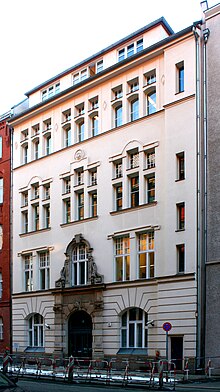Central Council of Jews in Germany


The Central Council of Jews in Germany (German name: Zentralrat der Juden in Deutschland) is a federation of German
The Zentralrat is the German affiliate of the World Jewish Congress (WJC).
History
In its early years, its leadership was composed of native German Jews (
At various times in its history, the organization has faced corruption scandals, most notably under the administration of Werner Nachmann (president 1969 until 1988), involving financial irregularities.[citation needed] After Nachmann's death (January 1988), Heinz Galinski (1912–1992), the chairman of the West Berlin Jewish community for 43 years, assumed the leadership of the Central Council and brought it stability and respectability. Under Ignatz Bubis
In more recent years, the division between more observant and more liberal Jews has strained the organisation, which remains (or claims to be) the sole representative body of the Jewish community in Germany and which generally supports strict observance. In April 2004, open controversy erupted between the leader of the Central Council, Paul Spiegel (1937–2006), and the leader of the more liberal organisation Union of Progressive Jews in Germany, Jan Mühlstein (born 1949). The latter demanded equal financial support from the government for his organisation.
In 2009, the Central Council criticised the Vatican over its decision to lift the excommunication on the bishops of the Society of Saint Pius X.[2] It later boycotted a ceremony in the Berlin parliament which commemorated victims of the Holocaust, saying its leaders had been treated without the proper respect in previous years.[3]
Chairpersons/Presidents
- 1954–1963: Heinz Galinski
- 1963–1969: Herbert Lewin
- 1969–1988: Werner Nachmann
- 1988–1992: Heinz Galinski
- 1992–1999: Ignatz Bubis
- 2000–2006: Paul Spiegel
- 2006–2010: Charlotte Knobloch
- 2010–2014: Dieter Graumann
- 2014–present: Josef Schuster
Secretaries-general
- 1950–1973: Hendrik George van Dam
- 1973–1988: Alexander Ginsburg
- 1988–1992: Micha Guttmann
- 2004-2014: Stephan J. Kramer
See also
- Central Council of Muslims in Germany (German name: Zentralrat der Muslime in Deutschland)
References
- ^ "Mitglieder - Karte der Landesverbände und jüdischen Gemeinden" (in German). Zentralrat der Juden in Deutschland. Archived from the original on 2016-12-28. Retrieved 2016-12-13.
- ^ German Jewish leader assails pope over peace with rebel bishops[permanent dead link]
- ^ "Council of Jews snubs German Holocaust ceremony". Reuters. Archived from the original on 2023-04-05.
Further reading
- Geller, Jay Howard (2005). Jews in Post-Holocaust Germany. New York: Cambridge University Press. ISBN 0-521-83353-1.
- Kauders, Anthony D. (2007). Unmögliche Heimat. Eine deutsch-jüdische Geschichte der Bundesrepublik (in German). Munich: Deutsche Verlags-Anstalt. ISBN 3-421-05924-1.
External links
- Official website
 (in German)
(in German)
